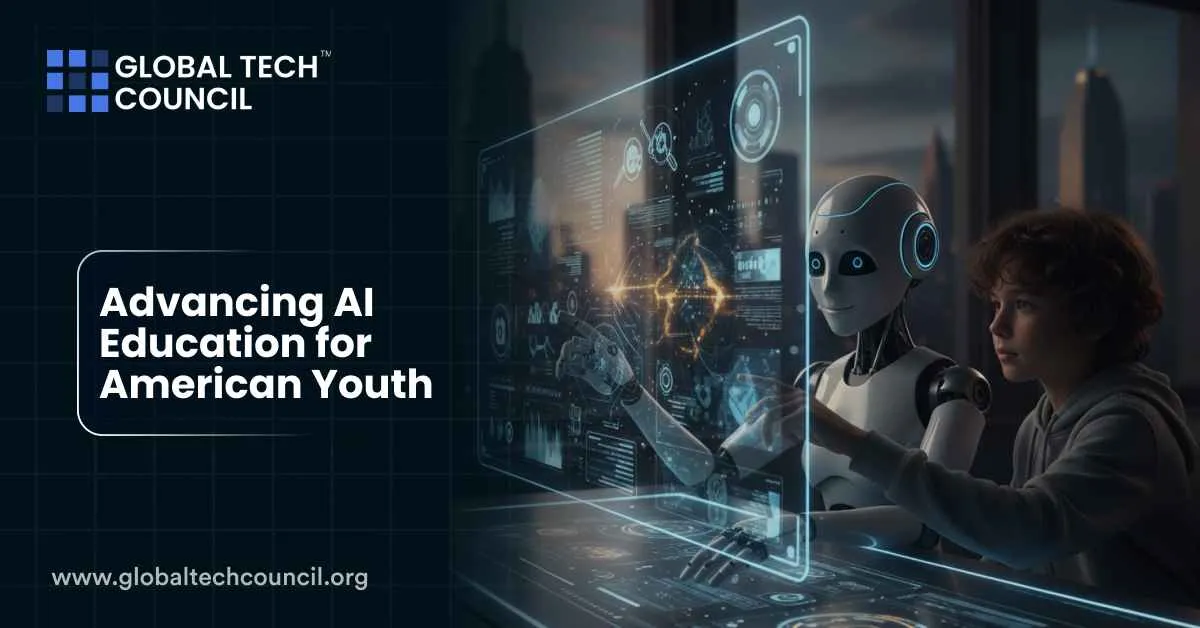
For students and educators, programs like an artificial intelligence certification provide structured pathways to understand and apply AI. These certifications are becoming an important part of career preparation, ensuring that both teachers and learners can use AI effectively and responsibly in education.
Federal Action and National Policy
In April 2025, the U.S. government announced the Advancing Artificial Intelligence Education for American Youth executive order. This order requires schools and universities to integrate AI literacy into their curricula. It also emphasizes early exposure to AI concepts, training for educators, and stronger connections between schools, businesses, and research organizations. The focus is on creating a future-ready workforce that is both technically skilled and ethically aware.
AI Literacy in Schools
AI literacy means helping students understand what AI is, how it works, and where it is used. The Department of Education recommends starting with simple classroom tools, expanding into coding and machine learning projects in high school, and offering advanced courses in college. Teachers are encouraged to use AI responsibly in grading and lesson planning while showing students the strengths and limits of the technology.
Educator Training and Support
One of the biggest challenges in advancing AI education is preparing teachers. Many educators are still new to AI tools. To address this, the government and companies like Microsoft, OpenAI, and Anthropic are investing in teacher training hubs. These programs equip educators with practical AI skills and resources to use in their classrooms. At the same time, they stress transparency, privacy, and oversight to keep AI use ethical.
Partnerships for Curriculum Development
Public-private partnerships are central to building AI resources for schools. Tech companies and nonprofits are working with the federal government to develop online platforms, toolkits, and curriculum guides that make AI education accessible. These partnerships help ensure that schools of all sizes, including underfunded districts, can access high-quality resources.
Key Drivers for AI Education in American Youth
| Focus Area | What It Means | Why It Matters |
| Federal Mandate | Executive order to expand AI education nationwide | Creates consistent standards and resources |
| Teacher Training | Professional development programs for educators | Ensures responsible and confident AI use |
| Curriculum Innovation | Online tools, AI challenges, and coding programs | Makes learning engaging and practical |
| Public-Private Partnerships | Collaboration between schools, government, and industry | Expands access and builds modern learning ecosystems |
This table outlines the main drivers shaping AI education policy and practice across the United States.
Hands-On Student Opportunities
The Presidential AI Challenge is one example of hands-on learning. It invites students to develop AI solutions to community problems, encouraging innovation and critical thinking. Beyond competitions, schools are integrating project-based AI lessons where students can apply tools like coding assistants, chatbots, and data visualization programs.
Pilot Programs in Districts
Different districts are experimenting with policies and practices. In Tampa Bay, one school district created strict guidelines for AI use, while another relied on existing academic integrity codes. In Westport, Connecticut, teachers, parents, and students collaborated on an AI ethics framework for classrooms. These pilot programs show that communities play a big role in shaping how AI is introduced to students.
Inclusivity and Ethical Concerns
Equity is a major issue in advancing AI education. Not all schools have equal resources, and some families worry about student data privacy. Parents often support AI in classrooms but also express concern about how data will be stored and used. To address this, educators are encouraged to teach not only technical skills but also ethical awareness and digital responsibility. Certifications like the Data Science Certification are designed to combine data literacy with ethics, helping professionals guide young learners responsibly.
The Role of Alternative Schools
New school models are also emerging. Alpha School, an AI-driven private school, is expanding in the U.S. with a model that relies on two hours of AI-based tutoring per day. While some view this as innovative, others worry about fairness and over-reliance on technology. These debates highlight the need for balance between technology and human teaching.
Practical Strategies for Building AI Education
| Strategy | Example | Benefit |
| AI Literacy Lessons | Teaching how AI works in daily tools | Builds foundational awareness from an early age |
| Teacher Development | Training hubs for K–12 teachers | Prepares educators to use AI responsibly |
| Student Challenges | Competitions like the Presidential AI Challenge | Encourages creativity and problem-solving |
| Community Involvement | Parents, teachers, and students drafting policies | Builds trust and ensures ethical oversight |
| Ethical Awareness | Lessons on privacy, fairness, and responsibility | Creates informed and responsible digital citizens |
This table provides strategies schools can use to advance AI education while keeping fairness and ethics in mind.
Why This Matters
Advancing AI education is about more than preparing students for jobs. It is about giving young people the tools to understand the technology shaping their world. AI will affect every field, from healthcare to marketing, so literacy in this area is as important as reading or math. For professionals shaping policy or curriculum, training programs such as Deep tech certification visit the Blockchain Council provide the broader context of advanced technologies. For those focused on applying AI to leadership and decision-making, the Marketing and Business Certification shows how to integrate AI insights into real-world strategies.
Conclusion
AI education for American youth is advancing rapidly through federal policy, teacher training, curriculum innovation, and community engagement. The goal is to prepare students not just to use AI but to question it, guide it, and apply it responsibly. With a mix of technical skills, ethical awareness, and practical experience, today’s students will be ready to become tomorrow’s innovators, leaders, and problem-solvers.
Leave a Reply